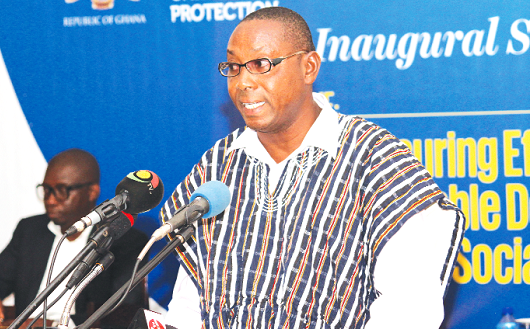
Social protection dialogue held in Accra
A national dialogue on social protection has been held in Accra with a focus on “targeting” as an effective tool in capturing the poor and vulnerable for social protection interventions in the country.
Advertisement
The dialogue, which was organised by the Ministry of Gender, Children and Social Protection with support from the World Bank, was to sensitise stakeholders to the targeting systems that had existed within the social protection system in the country, and improvements being made through the introduction of the Ghana National Household Registry (GNHR).
It was also to receive inputs from the stakeholders on how best targeting could be improved to ensure sustainable implementation of social protection.
Targeting is the process of identifying and selecting potential beneficiaries for a social protection programme to ensure that the resources of social protection programmes are directed at those who need them most.
Single registry
To ensure an effective targeting, the Ministry of Gender Children and Social Protection established the GNHR in 2015.
The GNHR is a single registry from which all social protection programmes locate beneficiaries for social intervention programmes.
A social protection specialist at the World Bank Ghana Office, Ms Christabel Dadzie, gave the assurance that the bank would support the country to ensure that the GNHR was implemented and adopted as an international best practice.
A commissioner at the National Development Planning Commission (NDPC), Mr Ebenezer Amarh Anuwah, in s statement, said despite significant progress in reducing poverty at the national level, a significant portion of society continued to face high and unacceptable levels of poverty.
Those portions of the society, he expanded, were not in a position to take advantage of whatever opportunities economic growth presented and as such, required assistance, either for a period of time or perpetually.
He said although Ghana had taken a bold step in recognising social protection as the way to go, there was still some way to go to ensure that it was provided in a coordinated manner.
Reducing duplication
The Minister of Gender, Children and Social Protection, Nana Oye Lithur, said in 2012, the ministry, together with its partners, agreed on the Common Targeting Mechanism (CTM), which introduced the Proxy Means Test (PMT) with an objective of ensuring a more scientific means of identifying beneficiaries of social protection interventions.
That process, she said, improved targeting for social protection programmes such as the Livelihood Empowerment Against Poverty (LEAP) programme.
She said to harmonise targeting and reduce duplications, the GNHR was introduced with the support of the World Bank to help establish accurate and up-to-date database of households from which all social protection programmes would select their respective beneficiaries.
Nana Oye said the registry would serve as a primary mechanism for ensuring effective and efficient targeting from more than one social protection intervention simultaneously.
The Government Statistician, Dr Philomena Nyarko, who chaired the programme, said globally, social protection had proven to be an effective strategy in poverty reduction.
She said Ghana had impressively made use of social protection as an intervention to reduce the current regional disparities being recorded, especially in the rural areas.